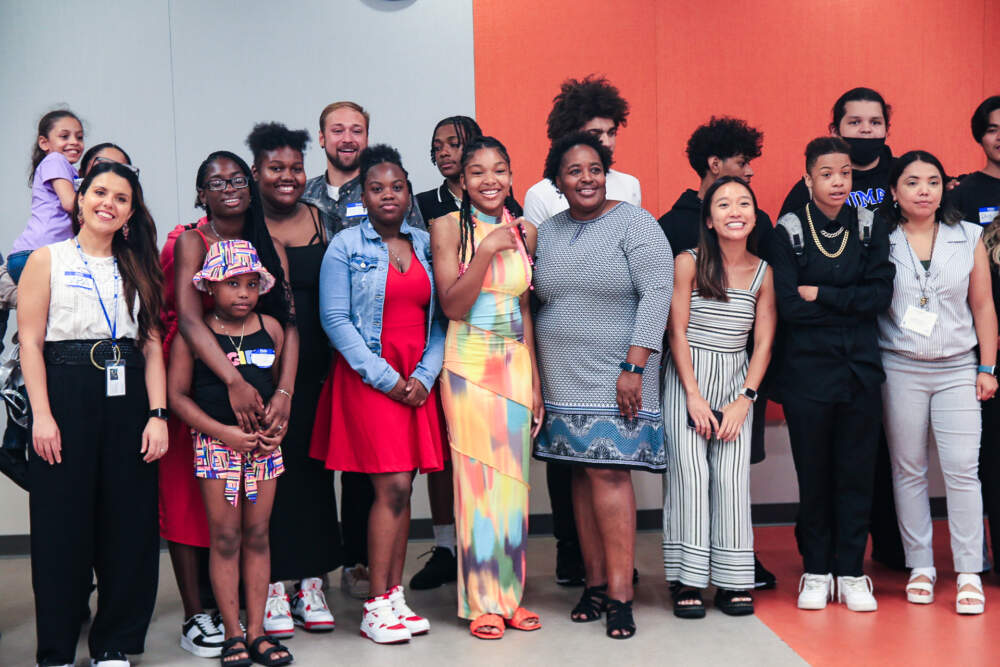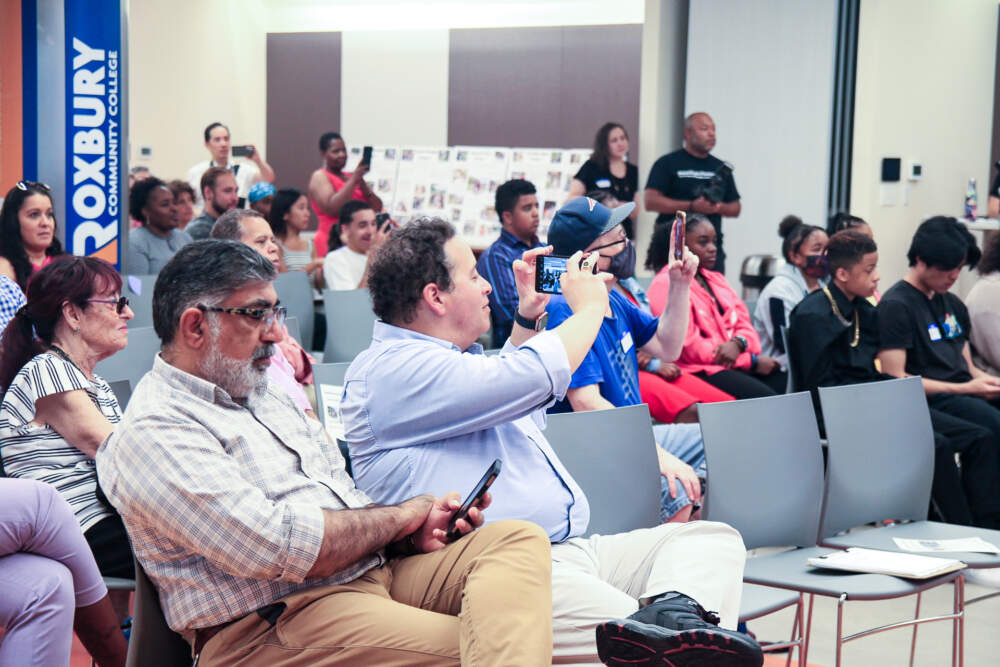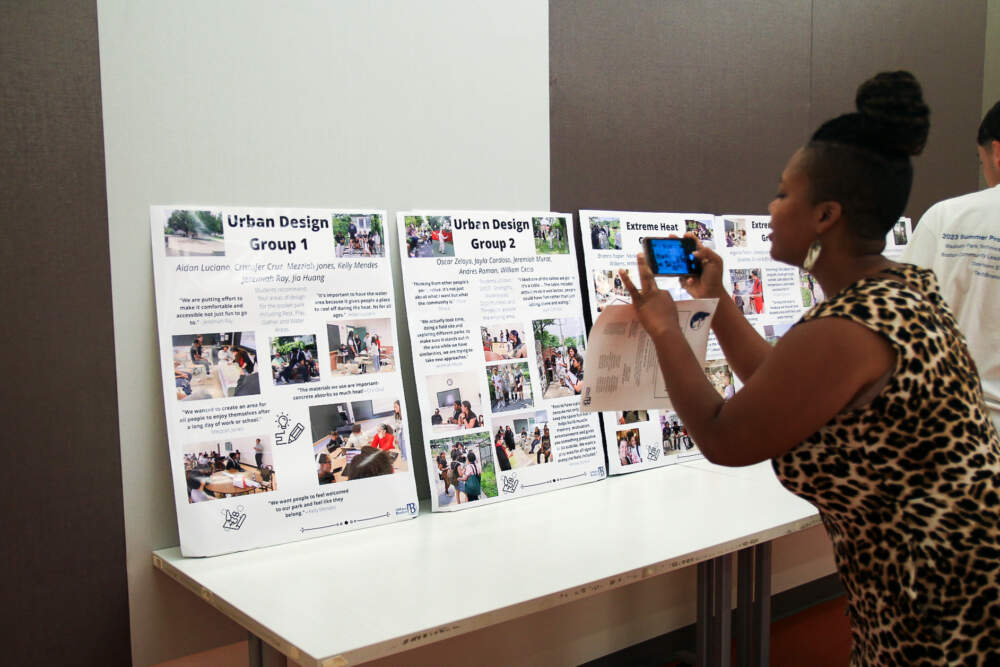Advertisement
Field Guide to Boston
Young urban planners: Boston students study solutions to extreme temps in city ‘heat islands’
Boston students recently wrapped up a month-long study of extreme heat in Roxbury, exploring ways to mitigate the crisis and its impact on residents through the field of urban planning.
Nearly 30 high school students participated in the University of Massachusetts Boston Summer Program in Urban Planning, which concluded Thursday with a presentation at Roxbury Community College. The experience is a joint venture of the Boston Planning and Development Agency, Boston Public Schools and other groups.
The program introduces students of color from environmental justice communities like Roxbury and Dorchester to careers in urban planning and design. It’s part of a larger effort to diversify the field of urban planning, which remains overwhelmingly white.
“Only 5.2% of Boston's planners are non-white, in a city where just in the city alone, 28% of our population is African American,” said Ken Reardon, co-founder of the program and chair of UMass Boston’s Department of Urban Planning and Community Development.

The program launched in 2022 with 15 students from Madison Park Technical Vocational High School. This year, it doubled in size to include high schoolers from Dearborn STEM Academy, TechBoston Academy, Blue Hills Regional Technical School, and the Boston Community Leadership Academy/McCormack School.
Many of the inaugural students returned for a second year.
Working with faculty from UMass Boston and Roxbury Community College, students addressed a critical problem facing their neighborhoods: extreme heat.
Built as a working class community at a time when extreme heat was not as common as it is today, Roxbury has densely-packed buildings with few trees, according to the students’ presentation. Many spaces are exposed to direct sun. Slides and swings in neighborhood playgrounds were constructed with heat-absorbing materials, making them unusable when temperatures rise.
In fact, the students found that air temperatures in Roxbury are, on average, 10 degrees warmer than at Boston’s Logan Airport.
Advertisement
They made this discovery by collecting 135 temperature readings across 38 Roxbury locations to identify the hottest spaces. Readings ranged from 83 to 102 degrees Fahrenheit, with the highest temperatures collected on sidewalks and at bus stops.
Collecting data was grueling, said Blue Hills Regional Technical student Aidan Luciano. He and his peers hit the streets with remote sensors recording the humidity and heat index during the month of July — when temperatures sometimes rose above 100 degrees.
“[But] it's going to pay off in the end because we are going to be helping other people,” Luciano said. “They aren’t going to have to suffer like we did.”
Students weren’t doing grunt work, said Reardon. They were in the driver’s seat.

One group designed a new cooling children’s playground on RCC’s campus. Scheduled to open in 2025, the playground will replace a parking lot near the historic Dudley House site. After further community input, the final design will incorporate many ideas from the students themselves, said Ruben Flores, special projects manager at Roxbury Community College.
Flores was particularly impressed by the inclusion of splash pads and water misters to reduce the temperature of the playground.
Participating students received college credit from UMass Boston and were paid around $15 an hour.
Paying students was an important part of making this opportunity accessible to low-income students of color who are less likely to be able to afford unpaid internships, Reardon said.
Beyond collecting temperature data, students sought to understand how Roxbury residents experience extreme heat, said TechBoston student Neicka Mathias.
Over the course of July, students interviewed nearly 100 Roxbury residents about coping with rising temperatures. The most common suggestion for improvement they heard was to increase the number of water sources throughout the neighborhood.
Students also worked with residents to identify public spaces in Roxbury where heat mitigation solutions are most needed. These include areas where people frequently wait for public transit or line up outside favorite local restaurants.

In many ways, the project is a model of the type of deep community engagement vital for urban planning, said Flores.
“Give a chance to these communities of color that are outside the spaces where decisions have been made and they will show you great work,” Flores said.
As a Black woman and Mattapan resident, Meshell Whyte said she has all too frequently observed people who don’t look like her — and don’t understand her neighborhood — impose decisions about how the space in her community is used.
“It’s almost like a slap in the face,” said Whyte, a mentor with the summer program who is studying urban planning at UMass.
That's why programs that teach students how impactful urban planning can be and offer them skills to engage in the process are vital, she said.
Madison Park student Winders Arias, a participant in the program this year, agrees.
“It’s important to stay in touch with the community and to participate because if you don’t, you could end up with a park that no one wants to go to and it’s just a waste of space,” he said.
Arias said he doesn’t think he will pursue a career in urban planning — he prefers computer programming and web development. But for the organizers of the summer program, that’s OK — what matters is engaging students in the project.
Angela Brooks, president of the American Planning Association and the first Black female to head that role, addressed the students on Thursday.
“Whether or not you become a planner, I hope you become a part of the process,” she said.
